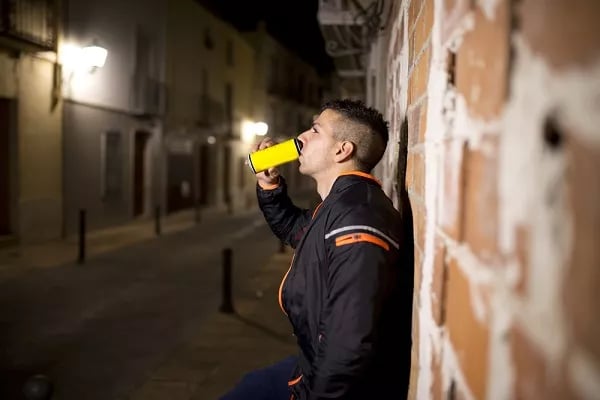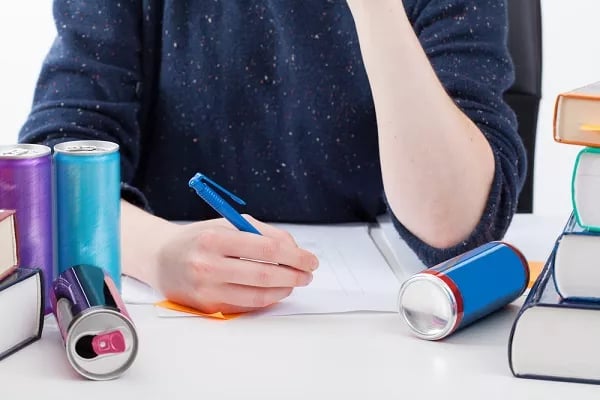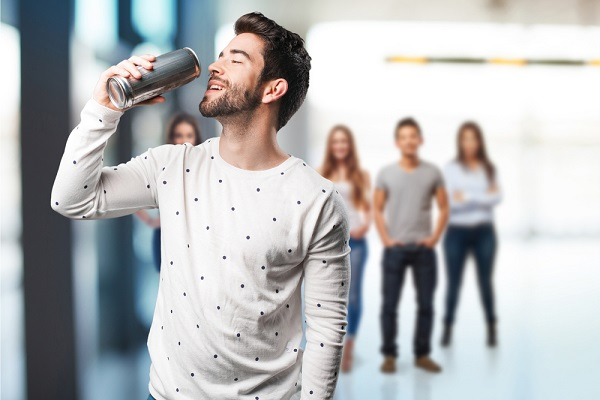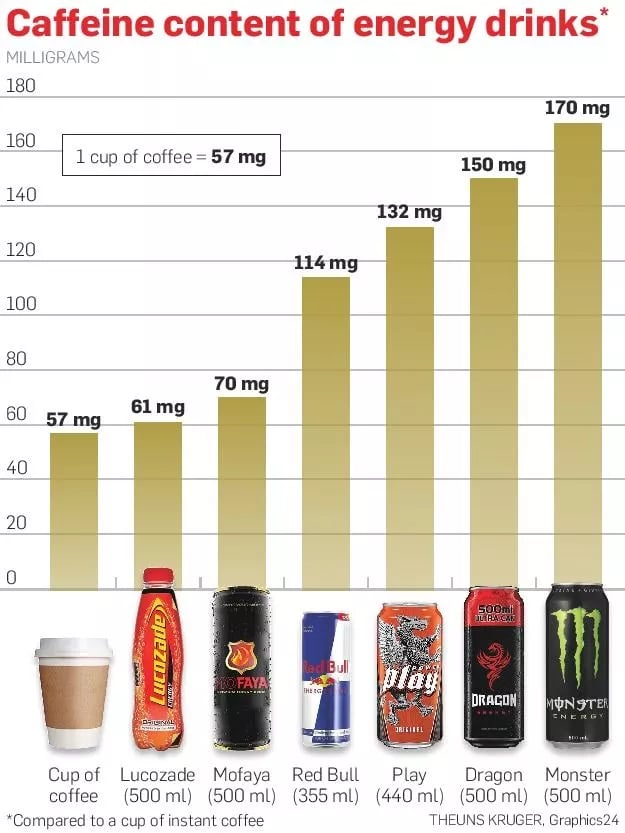Energy drinks pop up in the news on a somewhat regular basis, usually due to new research on health concerns. But did you know that it’s a little too easy to develop an energy drink addiction?
One of the more famous stories regarding energy drinks centers on Anheuser-Busch and its acquisition of Hiball Energy [1]. As the prominent beer company sought expansion, a venture into the world of non-alcoholic beverages made sense. It allowed them to broaden their market and appeal to a wider range of consumers. Ironically, it may also have allowed them to regain some of the customers they had lost.
We’re talking about addicts and alcoholics, whose younger population sometimes consumes energy drinks in astounding quantities.
Energy Drink Addiction
Young people in general flock to energy drinks with gusto. Give your average teenager a weekend alone with a video game console, and their shopping list for carbonated beverages may very well exceed the weekly grocery lists in most households. But put this same thirsty gamer against a young person recovering from alcoholism, and the alcoholic will—for lack of a better term—drink them under the table. Especially if the alcoholic in question is an IOP client who was previously banned from bringing energy drinks into day/night treatment.
Perhaps this is a slight exaggeration, but just go to a local AA or NA meeting with a heavy attendance of young people and you can see it for yourself. See if you can even find three such meetings a week in which you don’t see at least two or three cans on the tables. You’ll occasionally see someone down two of the larger cans in one sitting. Between that and the abundance of coffee—a long-time staple of recovery meetings—you may find yourself wondering what it is about recovery that makes people so darn tired.
This all raises an interesting question. Are energy drinks addictive?
What is Energy Drink Addiction?
Being addicted to something is to seek it out even when it is harmful to you. With time, addictive substances change the way our body and brain function.
Energy drinks get their name from their ability to make you feel like you have more energy after drinking them. To give you this boost they typically contain:
- Caffeine
- Sugar
- Taurine
- B vitamins
Included are also other stimulants that either increase awareness and attention or help you to feel good and relaxed. However, consumption of these same chemicals, especially in energy drink form, can develop easily into an addiction. There are several reasons for this:
- These substances are chemically addictive. Most notable among them are caffeine and sugar.
- Energy drinks often rely on an excessive volume of caffeine and sugar to have a noticeable effect.
- As you associate drinking energy drinks with productivity, you may expect to rely on them to be productive altogether.
As we strive to let go of compulsive behaviors, are we simply replacing alcohol addiction with an energy drink addiction? It’s a matter that warrants exploration, beginning with the reasons for banning energy drinks from day/night treatment in the first place.
Replacing Alcohol Addiction With Energy Drink Addiction
Established treatment centers such as Avenues Recovery must provide more than just a few meetings and some therapy. Our patients cannot recover without a suitable, supportive and healthy environment in which to do so. And we simply cannot claim to offer a healthy environment if we’re allowing our clients to pump themselves full of carbonated chemicals. The caffeine content alone poses health risks, as anyone who’s ever pounded a full pot of coffee in a short time should be aware. And the caffeine content of energy drinks is even higher. The result? According to Dr. Kathleen Miller [1] of the University at Buffalo Research Institute on Addictions:
“Get high enough levels—and I’m not talking really, super high here, say 500 milligrams of caffeine, that’s the equivalent of five cups of coffee—and you run into what’s called caffeine toxicity. That includes the headaches, tremors, heart palpitations, and nausea. At high enough levels—and this is fairly unusual—caffeine is toxic enough that, for some people, it can cause seizures, mania, hallucinations, even strokes.”
While perhaps reassuring to know that hallucinations rank as “fairly unusual”, heart palpitations and nausea don’t sell energy drinks as part of a healthy diet. And perhaps these symptoms require high consumption, but therein lies the problem. To consume energy drinks without adverse health effects, one must practice a degree of restraint. Allowing energy drinks in treatment would essentially be asking clients in early recovery to practice consuming a potentially mind-altering substance in moderation. It sends a mixed message at best.
The effects of caffeine don’t necessarily cease when you quit consuming it, either. The DSM-5 identifies caffeine withdrawal syndrome as the experience of depression and fatigue when skipping your daily dose of liquid energy. This can also cause difficulties in concentrating. If this happens with coffee, consider the higher caffeine content of energy drinks. And the caffeine content is higher than you might think, due to the natural caffeine offered by ingredients such as guarana berries.
Why We Ban Energy Drinks in Treatment

With such an overabundance of caffeine in our energy drinks, the addiction factor might rank higher as well. And an addiction factor most certainly does exist. Unfortunately, according to Dr. Alan Budney [2] of Dartmouth Medical School, many people overlook this quality:
“The world doesn’t broadcast that caffeine can be an addictive drug that might cause problems. Certainly, its overuse might not be as scary as other drugs; the consequences aren’t so dramatic. Such less severe consequences, however, may reduce awareness or concern about a potential problem that could prompt taking action.”
Despite this, it may still feel to some as if energy drinks get the short end of the stick. After all, we do still allow coffee and cigarettes. But not everybody smokes, and most people limit their coffee intake due to its bitterness and the need to consume hot beverages slowly. Sipping slowly allows the caffeine time to take effect. Meanwhile, many people guzzle multiple energy drinks before the first one even hits their system.
Moreover, the disbelief of many that energy drinks can prove harmful leads to a bit of defiance when told not to consume them. In addiction recovery, we refer to this as the need to “get what we want when we want it”. We must fight this type of impulse if we wish to stay sober. And many certainly suffer from this type of thinking when it comes to energy drinks. We see this often when clients leave day/night treatment and begin outpatient. With no more restrictions on beverages, energy drinks sometimes become the center of numerous reckless behaviors.
Swinging the Pendulum in the Other Direction

Whether or not they understand our reasons for restricting energy drinks in day/night treatment, there are certainly clients who overconsume them once they arrive in our aftercare program. To the clients in question, it seems like a relatively harmless indulgence. And in all fairness, they certainly intend it as nothing more. Unfortunately, this new addiction to energy drinks can sometimes lead to various complications in both their recovery and their personal lives.
As people begin consuming more and more energy drinks, their sleep schedule often suffers as a result. This makes it much more difficult to establish a healthy routine. When clients first enter outpatient housing, their primary focus tends to be seeking employment. But the early bird gets the work, so to speak. Those who arise early and speak to managers before they get busy may fare better than those who wait until the afternoon when many businesses tend to get slammed. Not to mention the fact that those who wake up earlier can spend more of the day sending out applications. More than anything, however, maintaining a normal sleep schedule prepares clients for a working lifestyle. We understand wanting to enjoy your time off while looking for a job. Late nights however, won’t do much to help motivation or prospects.
We also see many people begin breaking the rules just to consume more energy drinks. For instance, while outpatient treatment clients may consume energy drinks if they wish, we still do not allow them to bring these beverages into our main center when they attend aftercare groups. Nonetheless, many attempt to sneak them in. Other clients sometimes pressure the drivers to stop at the corner store so they can stock up, resulting in late arrival to appointments. These are clearly not the worst infractions ever, but disrespect for structure sometimes speaks to larger problems in recovery.
Healthy Consumption of Energy Drinks

It may sound like something of an oxymoron to talk about healthily consuming energy drinks. Nonetheless, one can at least take steps to reduce issues like those described above.
Concerning health issues, simply pay attention to the ingredients of the drinks that you buy. Many brands do not list their caffeine content on the can, but you can usually find this information online. Ideally, try to find something with 100 milligrams or less. It’s advisable to find drinks without guarana, which raises the caffeine content beyond that which is measured. And bear in mind that some brands, such as Hiball, offer way more health-conscious drinks than others. But no matter which drinks you buy, attempt to consume them in moderation. More than two or three a day becomes excessive. More than five becomes a potential health concern.
Timing Also Contributes
Time factors into healthy decision-making as well. Many sleep experts suggest abstaining from caffeine after 2 PM. To most human beings, this sounds outlandish. Don’t worry about following it too strictly. But when you can, you might at least want to abstain from consuming any caffeine within a bare minimum of three to four hours before going to sleep. The longer you give yourself to get it out of your system, the better.
Some people feel drawn to consume coffee or energy drinks late in the day for the sheer sake of taste. Although they stopped putting cocaine in Coca-Cola years ago, the caffeine content in it can also disturb your sleep if you down a can later in the day. If you need to drink something other than water before bed, you can find other options, for instance, cherries contain natural melatonin, so a glass or two of cherry juice throughout the day could benefit your sleep schedule quite a bit. Just try to stick with tart cherries, since the sugar in sweet cherries might interfere with the effects. Tea also helps you fall sleep by calming your mind and comes in many varieties that may offer other health benefits as well.
Treating All Addictions
Improving your sleep and watching your physical health will go a long way toward ensuring physical and mental well-being. More importantly than anything, however, always monitor your motivations. In and of themselves, energy drinks pose no threat to your recovery. But when you place them before health or the rules of a treatment facility, this becomes a problem. As long as you can say with complete certainty that this is not the case, you’re likely fine. If not, then take a look at your behaviors.
Energy drinks do not have to act as a substitute addiction. As with all things, the key to healthy behavior is to strive for moderation. Overuse is a monster, and its venom will hit you with a bang when you find your healthy routine starting to red-line. But maintain a sense of balance, and you can continue to amp yourself up, spread your wings and recover like a rock star.
If you’re looking for support or simply a listening ear, contact Avenues Recovery to speak with an experienced member of our staff. Pioneers in addiction rehabilitation, we offer multiple supports for addiction and alcohol withdrawal.



